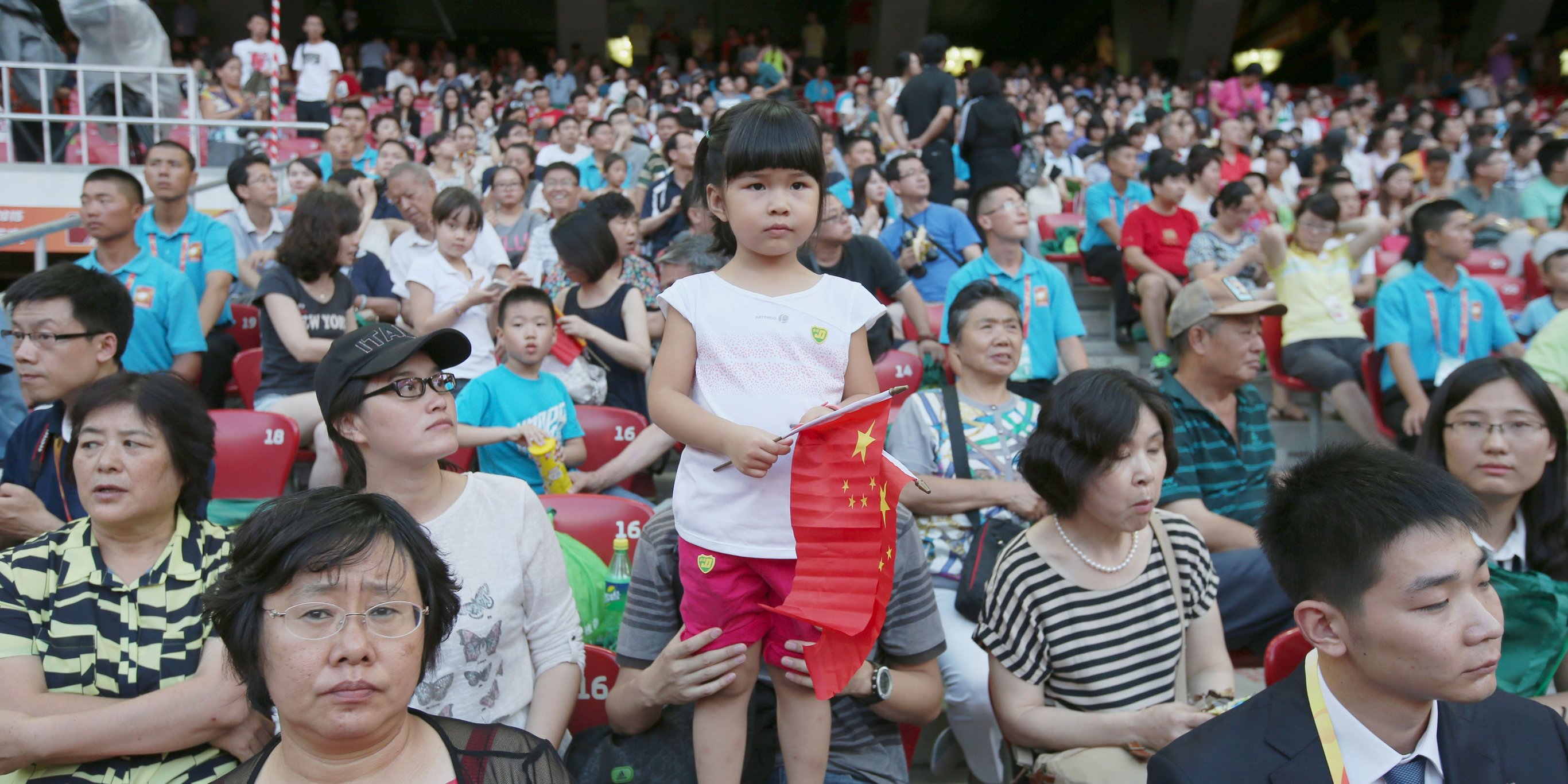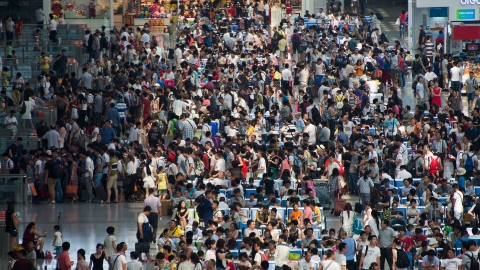With the rising cost of living and increasing uncertainty about the future, many couples have poured all their energy and money into their only child.
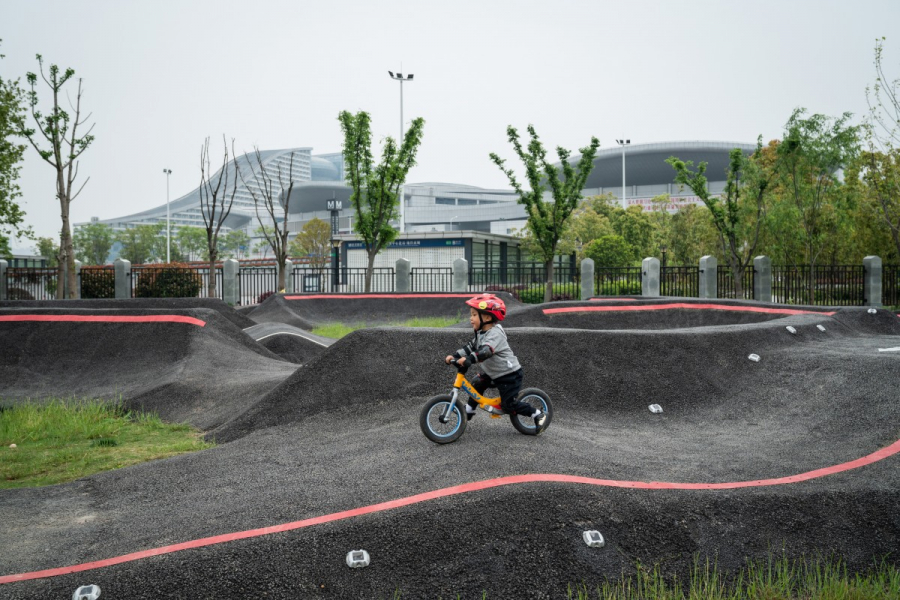
Two-year-old Xiao Kaixi is learning to ride a bicycle. He is Zhou's only son.
The story begins with Liu Fang. Nine years ago, her job was to ensure that all the women in the village would not give birth to children not recognized by the authorities. If couples had daughters or children with disabilities, they would be given another chance to have children again. For couples who already had two children or sons, Liu's job was to distribute condoms and warn women to use IUDs. If they unfortunately became pregnant again, Liu would encourage them to have an abortion.
As a representative of the All-China Women's Association in Nanchuan—a town of 60,000 people located on the outskirts of the city—Liu was entrusted with the task of monitoring the population in her area. Her performance was judged based on the number of children born, with the criterion being the fewer the better.
However, after the Chinese government abandoned the one-child policy three years ago, Liu's task shifted from ensuring local women didn't have too many children to encouraging them to have as many as possible.

Zhou is preparing to teach his son, Xiao Kaixi, to ride a bicycle.
Throughout the period of the one-child policy, propaganda slogans carrying the same message echoed across the country: "The fewer children you have, the faster you'll get rich." And although it became widely known by the name...one-child policybut in reality, people call this1.5 child policyBecause the second child born, thus violating the one-child policy, would not be allowed to attend public schools or receive public healthcare, they would have virtually no social standing. This is also why, according to statistics from the National Health Commission, there have been approximately 400 million abortions in China since 1980.
This is a consequence of the somewhat extreme social reforms implemented by the government to limit birth rates for 36 years. This was part of a campaign to develop the economy and improve the quality of life, based on the belief that population control would make it easier to increase per capita income. This idea essentially worked, as today, approximately 100 million people under 40 were born during the period of the one-child policy. Income has increased from around $200 per person in 1980 to $10,000 per person today.
However, this policy has been taken to an extreme.
Nowadays, almost everyone wants to have no more than one child. China's population is projected to reach 1.45 billion as early as 2027 and then begin to decline for decades. By 2050, about one-third of the population will be over 65, and the number of people in the working age group is also projected to decrease. So what will be the driving force of the economy? Who will care for the older generation? Who will pay the taxes on the apartments?
While China was previously criticized for its population explosion and uncontrolled population growth, it is now facing the problem of having too few young people.
Many experts believe that this nation, with its millennia-old history, is beginning to disintegrate into smaller groups of aging and frail inhabitants, largely due to misguided population control policies.
The Beijing authorities seem to have realized this and adjusted to the two-child policy in 2016. Although they once declared having one child a patriotic duty for couples, they now say that ideal Chinese people should have at least two children.
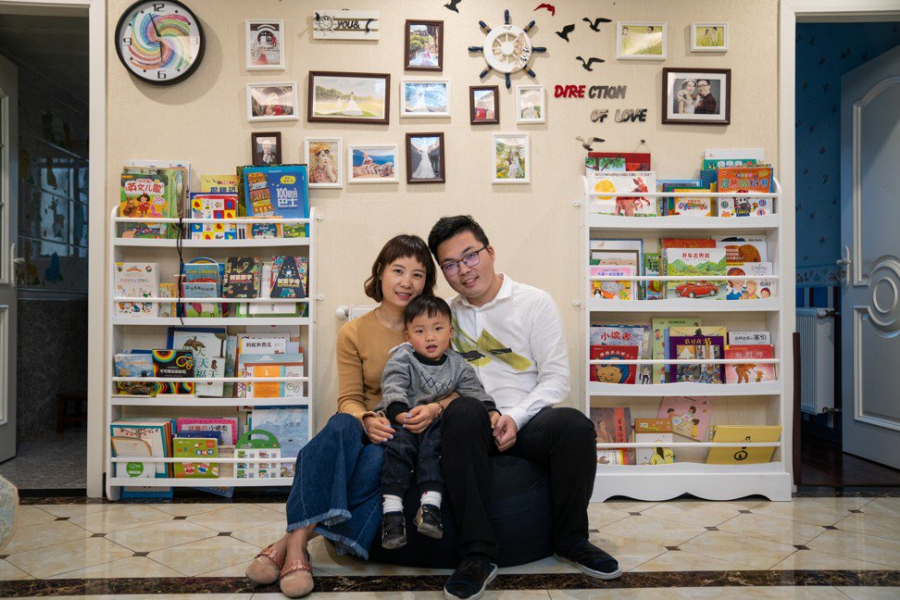
Zhou Jing with her husband and son in their home in Wuhan.
Having children is no longer just a matter for individual families, but has become a national issue. The reluctance to have children has now become a burdensome ideology for society as a whole.
However, it is noteworthy that government policies have had very little impact on modern-day China's birth rate.
The national population growth plan projected around 20 million births in 2018, ushering in a population boom following the end of the one-child policy. However, only about 15.23 million births occurred in China last year, 2 million fewer than the previous year.
And all of these factors directly contribute to the economic downturn.
As China began its transformation, the cost of living skyrocketed, especially in major cities. People in their 20s today realize their quality of life is far better than their parents' and expect their children to enjoy similar benefits.
"We both want a second child. We want our son to have someone to play with," said Zhou Jing, a 29-year-old mother in Wuhan, Hubei province.
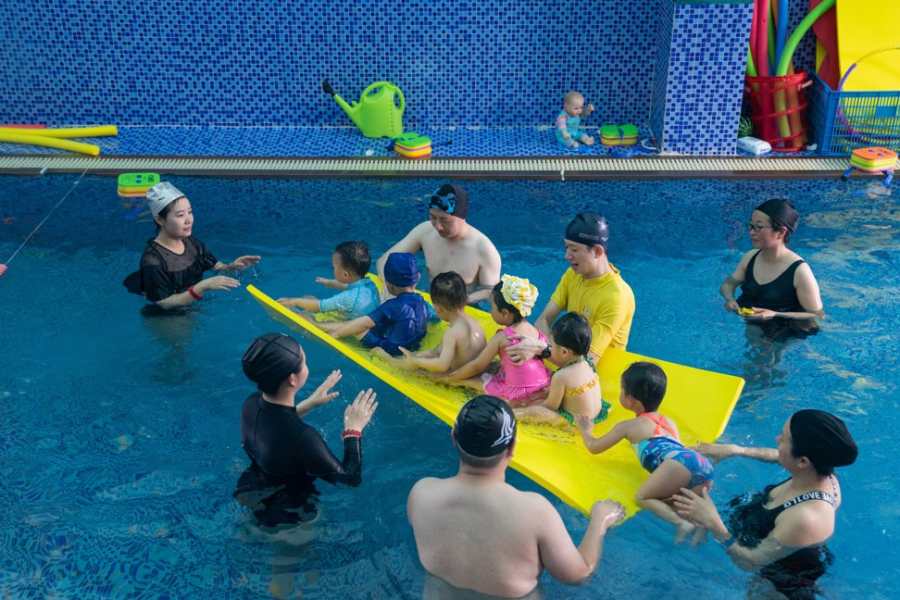
Zhou took swimming lessons with his son.
Many parents spend as much as $15,000 a year sending their preschoolers to English classes, piano lessons, dance classes, art classes, and gymnastics classes. And this is just the statistic from Wuhan, not Beijing or Shanghai.
Contrary to their genuine desire to have a second child, the Zhou couple were extremely worried about the financial aspect. They currently run a T-shirt business, but it's not financially stable.
"If we have a second child and the business unfortunately doesn't do well, my son's quality of life will suffer, and I won't be able to provide for both of them at the same time. Furthermore, having two children will make it more difficult for me to work."
This is a common situation in China, where parents shower their only child with everything good.
Wang Feng, a sociologist at the University of California, Irvine, says that Chinese couples have virtually only one aspiration: for their children to climb higher on the social ladder or at least not be stuck in the middle of life. The issue is no longer about providing food and education, but about achieving success and having a better life.
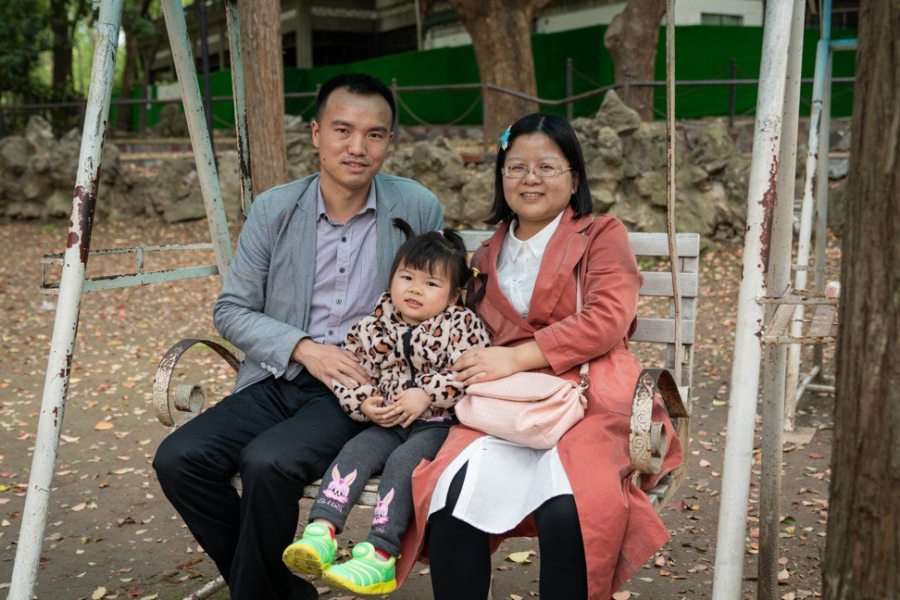
Zeng Yulin (right) and Zhang Dongyuan with their 3-year-old daughter in a park in Wuhan.
Zeng Ylin, 32, a master's graduate in International Economics, takes her nearly four-year-old daughter, Yuewei, to art class every day and ice skating class twice a week. She also takes singing lessons and classes specializing in public speaking. Zeng even teaches her daughter English at home.
"I just hope that my daughter can maintain my current status and standard of living," Zeng said, sitting on the floor of the central library. "If she has the opportunity, I hope she goes even further."
Zeng's husband, who works in construction, wants to have more children, but Zeng believes he doesn't earn enough money to make that happen.
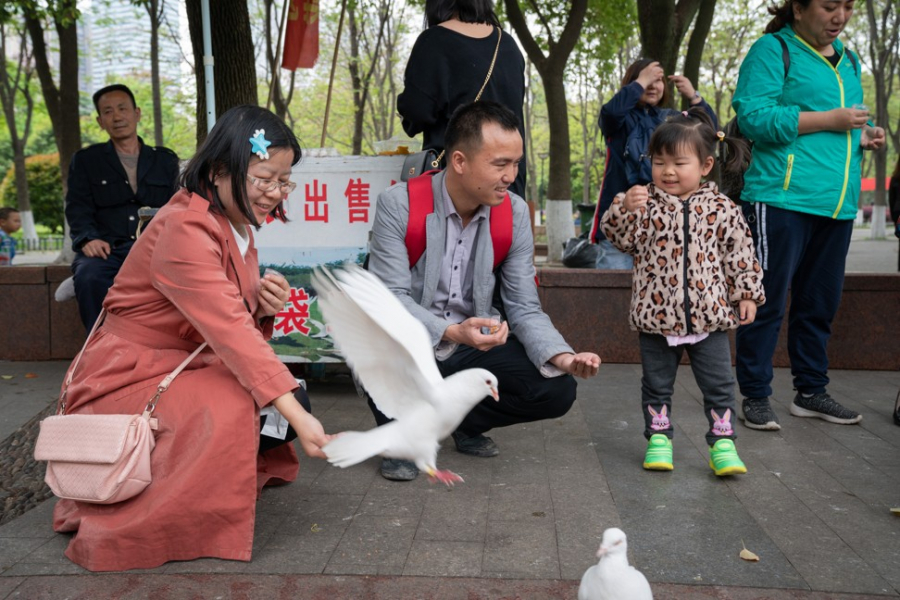
Zeng's family feeds pigeons in the park.
Zhou and Zeng represent the majority of parents in Chinese society today. In a 2017 survey of working mothers on zhaopin.com—the country's largest job search website—only about 22.5% of participants said they wanted a second child. Nearly three times that number said they did not want more than one child.
Realizing that the new policy did not fulfill their desires or aspirations for children, Chinese leaders had to return to drafting and formulating a new policy.
At the National People's Congress session in March this year, representatives from provinces and cities across the country gathered to discuss this issue. One delegate proposed lowering the legal marriage age by two years, to 20 for men and 18 for women. Another delegate suggested that families with a second child should receive special subsidies to help with living expenses, while yet another proposed establishing a "Chinese Children's Day" on May 28th each year. Some even suggested increasing taxes or penalties on childless couples, leading many women to fear that abortion policies might be banned.
Provincial governments are also beginning to take action in their own ways, particularly Hubei (including Wuhan and Nanchuan), which is considered to have pioneered ideas in encouraging childbirth. The province has built more than 2,500 maternity homes. Many other cities have implemented policies to provide free medical assistance for those having a second child, while some others offer a $180 bonus to families with a second child.
In some places, like Nanxuan Village where Liu works, even prenatal checkups and pregnancy care services are free of charge.
However, even rural areas are experiencing a decline in actual birth rates. Around 504 children were born in the town in 2016, then this dropped to 477 in 2017 and to just 460 last year.
Liu couldn't even convince Tang Xu, a Communist Party member, to have a second child. Tang argued that despite the government's new policies, having children was simply too expensive.
They wouldn't have enough money to send their children to art classes, piano lessons, or other extracurricular activities while still struggling to buy a house for their son – who is considered the heir and will take care of them in their old age. Their daughter will grow up, get married, and move to her husband's home. The thought of having to buy two properties for their children is truly unthinkable.
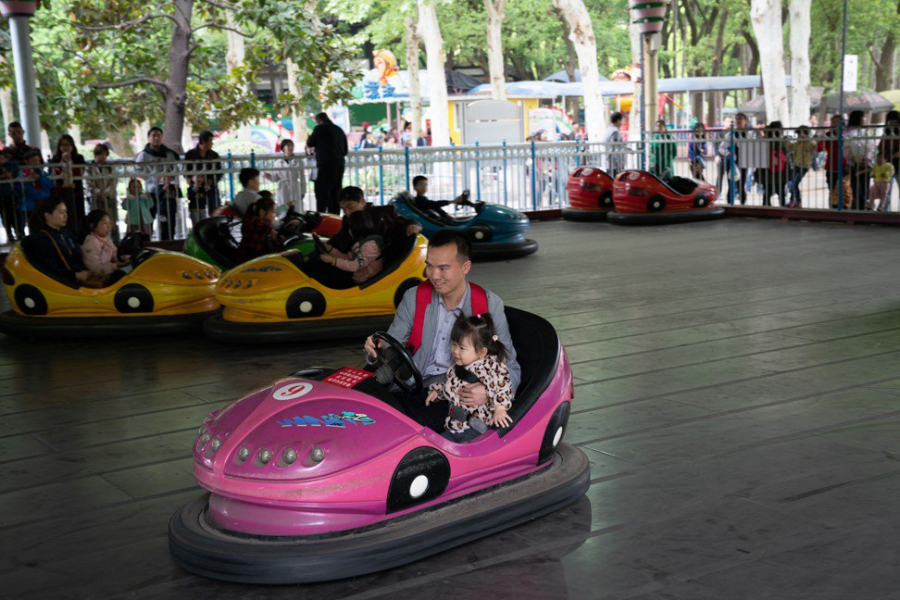
Zhang Yuewei and her father were playing bumper cars in the park.
"In China, if you don't buy a house for your son, he won't be able to get married," said Ms. Zhang, who drives a taxi to earn extra income to buy an apartment for her 20-year-old son.
She added a familiar Chinese proverb before concluding her story: "Having two children is like peeling off your own skin."

 VI
VI EN
EN



